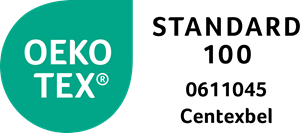Quality
Oeko-tex
OEKO-TEX Standard 100 is an independent testing and certification system for textile products from all stages of production along the textile value chain.
The aim was to make it obvious to consumers that the textile products certified with the label ‘Confidence in Textiles’ had undergone laboratory testing. Textiles with this label are proven to remain below the set limit values for certain harmful substances.
Confidence in Textiles: since 1992 that has been the motto of OEKO-TEX Standard 100, the gold standard for independent testing of fabrics for harmful substances.
The internationally binding test catalogue according to OEKO-TEX Standard 100 is based on scientifically-proven parameters and is revised annually in line with the latest legislation and research. It includes the following:
- Illegal substances such as carcinogenic colorants (causes cancer).
- Legally regulated substances such as heavy metals (lead, mercury, etc.).
- Substances which are known to be harmful to health but not yet regulated /prohibited by law such as pesticides, allergenic dyes (causes allergies).
- Parameters such as colour fastness (lasting colours) and a skin-friendly pH-value (sensitive skin friendly), which are precautionary measures to safeguard consumer health.
Textile ecology consists of 4 sectors:
- Production ecology
Examines the impact of production processes on people and environment, e.g. occupational health and safety, material, water and energy consumption, waste water and waste treatment as well as generation of dust and noise.
- Human ecology
Human ecology deals with the impact of textiles and their chemical ingredients on the health and well-being of humans.
- Performance ecology
Performance ecology comes in at the usage phase of textile products. It examines the environmental impact of washing, cleaning and caring for textiles.
- Disposal ecology
Analyses the problems connected with disposal, reuse, recycling and removal (thermal recycling or landfill) of textiles.
Textile products may be certified according to OEKO-TEX Standard 100 only if all components meet the required criteria without exception.
The certification is carried out following a written application by the manufacturer to one of the authorised test institutes or official representative offices around the world. The submitted sample materials are tested exclusively at the member institutes in Europe and Japan to ensure a consistently high testing level.
One prerequisite for the awarding of certification is a declaration of conformity by the manufacturer stating the successfully tested textile samples shall correspond at all times with the quality of the products manufactured or sold throughout the 12 month license period.
Another prerequisite for certification are company audits, where auditors from OEKO-TEX test institutes, together with the applying company, examine the company quality assurance and production processes to create the best possible certification conditions and to ensure steady human ecology product quality for the duration of the certification.
The OEKO-TEX certification also includes regular product controls as a fixed part of the system. These are carried out on the market by the OEKO-TEX institutes to ensure compliance with the required criteria on a regular basis.

